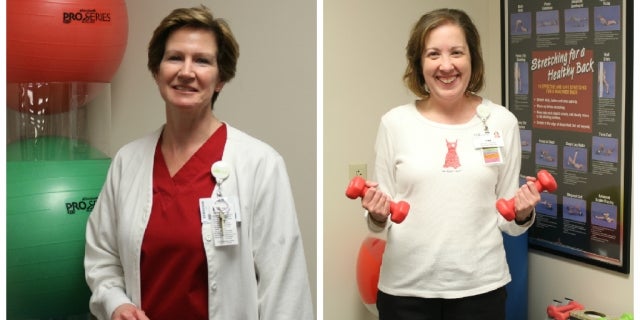After surviving a heart attack or major cardiovascular event, new questions, fears and doubt present new considerations for everyday life. What if I have another heart attack? Will I be able to go back to work? Resume my daily activities? How will I know when my heart has healed? Living with heart disease changes your life for sure, but under the guidance of your cardiologist your heart can get stronger and daily life will resume overtime. Among changes including diet and medication, cardiac rehab can help you regain strength, while also helping to prevent a future cardiovascular event. As we recognize Cardiac Rehab Week, we learn more about what patients should expect from the program at Hillcrest South from cardiac rehab nurse Tina Holloway, RN, and exercise physiologist Jill Conner, MS.
What is Cardiac Rehab?
Cardiac rehabilitation is a supervised exercise program to help patients, who have had a heart attack, heart surgery or other form of interventional heart procedure, recover and rebuild their heart. In addition to customized and monitored exercise up to three times per week, cardiac rehab at Hillcrest South offers patients education on lifestyle modifications, dietary and emotional support and stress management.
“Whether you begin cardiac rehab in a wheel chair or you have recently been a marathon runner, the patients who experience the most success in cardiac rehab are those who attend exercise sessions on a regular basis and take advantage of learning about heart healthy nutrition, cardiac medications and reducing risk factors,” explains exercise physiologist Jill Conner, MS. “Success can mean weight loss, gaining strength, being able to walk without a wheel chair or a walker, or even improving running speed. What you put into cardiac rehab is what you get out of cardiac rehab.”
Facing Changes with Cardiac Rehab
As previously mentioned, it is common for heart patients to experience a variety of emotions following a heart event and beginning a new program such as cardiac rehab does not come without its own considerations. “We have some patients come in for cardiac rehab that have been very active before a heart attack,” adds cardiac rehab nurse Tina Holloway, RN. “They are scared to exercise at the same intensity they did before.”
Before beginning any exercise, patients are evaluated for their own physical fitness. This allows the cardiac rehab team to establish individual goals for the patient and a plan for achieving those throughout the program. Heart rate and blood pressure are monitored throughout any exercise, while also educating the patient on safe thresholds and how to check heart rate and intensity of physical exertion at home later on in the program. “The program gives them the confidence to increase exercise intensity safely.”
Benefits of Cardiac Rehab
Being an engaged cardiac rehab patient who attends regular exercise sessions and works towards established goals helps rebuild heart muscle, which may have been damaged or weakened from a heart attack or heart surgery. Also, cardiac rehab offers patients the opportunity to see medical professionals on a regular basis to ask questions and gain support and counseling on efforts such as quitting smoking, losing weight and lowering blood pressure and cholesterol levels. By attending a supervised cardiac rehab program, heart patients can reduce their risk of future heart events.
Research shows cardiac rehab helps to slow the progression or even reduce the severity of atherosclerosis, improve heart function, reduce inflammation, improve blood pressure and cholesterol levels, and reduce the risk of sudden cardiac death, among other benefits.
To gain these benefits, however, it takes work. “We push people to exercise at a moderate intensity and sometimes that is a new feeling for our patients,” shares Conner. “At first they aren’t sure they like exercising, but then they notice that they feel better, sleep better and have more energy. Then, they become competitive with themselves and try to have a better workout each time they come in to cardiac rehab. The end result of this is people feeling better overall and a developing a love for exercise that they will continue throughout their life, even after they graduate from cardiac rehab.”
To learn more about cardiac rehab please call 918-294-4884.
Cardiac Rehab is covered by insurance for only the following diagnoses:
- Heart attack (within the past year)
- CABG – coronary artery bypass surgery (within the past 3 months)
- Heart valve repair or replacement (within the past 3 months)
- Coronary stent (within the past 3 months)
- Coronary PTCA (within the past 3 months)
- Heart transplant (within the past 3 months)
- Stable Angina
- Congestive Heart Failure

